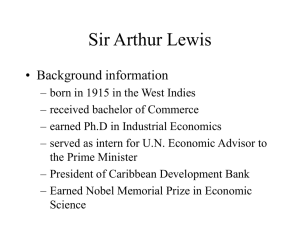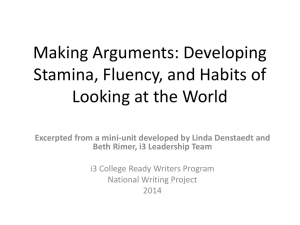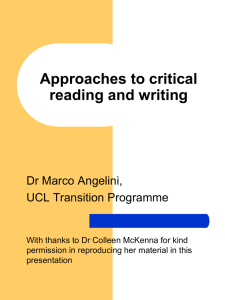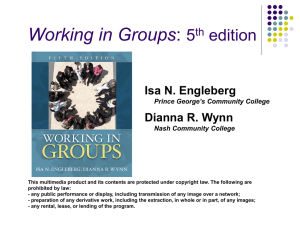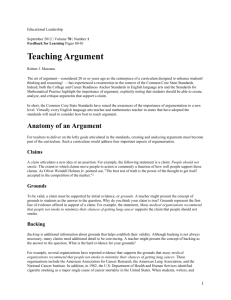argumentation vocabulary terms
advertisement
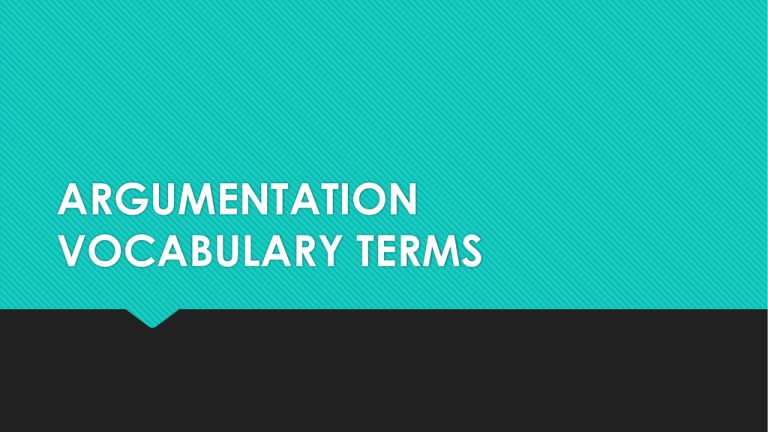
ARGUMENTATION VOCABULARY TERMS Analyze To methodically examine in detail the composition or structure of something, (especially information or evidence), for purposes of explanation and interpretation. The detective was asked to analyze the evidence for the case. Anecdote A brief narrative account, often intended to illustrate or support a point. NOTE: The expression anecdotal evidence refers to the use of particular instances or concrete examples to support a claim. Such information (sometimes referred to negatively as "hearsay") may be compelling but does not, in itself, provide proof. Although the defense lawyer provided several clever anecdotes, this was not sufficient evidence to win the case. Argumentation the act or process of forming reasons and drawing conclusions in support for or opposition to a given topic in discussion or writing He tried to use argumentation, rather than force, to convince his opponents. Backing In argumentation, the support or explanation provided for the warrant. NOTE: The backing is often characterized by the word because. The fact that the team with the best defense has won the Superbowl for the last five years, was his backing for stating that the team with the best defense would win the Superbowl once again. Claim The main idea or point being maintained as true Because the prosecuting attorney was so unclear, the judge had to ask, “What is your claim?” Conclusion the end decision or judgment reached by reasoning and examination of evidence After analyzing all of the evidence, their conclusion was that Arthur was a hopeless drunk. Consequences In logic, the relationships between statements that hold true when one logically "follows from" one or more to others; the conclusions that follow the premises Cameron is CHS football player. All CHS football players are red devils. Consequently, it follows that Cameron is a red devil. Counterargument a contrasting, opposing, or refuting argument to the initial argument at hand Shannon and Alison were ready to offer their counterargument to Mr. McMahon about why they should be allowed to bring a 21-year-old guest to the homecoming dance. Evidence Data or grounds to prove or disprove something Although the jury believed Queenie was guilty, there was not enough evidence to prove it. Experts a person who has special skill or know -ledge in a particular field; a specialist or an authority The expert stated that he did not feel the level of intoxication was enough to cause the victim’s death. Generalization a proposition asserting something to be true either of all members of a certain category or of an indefinite part of that category The employer’s generalization about teenagers was that all teenagers are lazy. Grounds The foundation or basis for the claim; the supporting evidence for the argument There were no grounds to prove the claim that the Indians would soon have a winning team again. Misrepresentation the action or offense of giving a false or misleading account Mrs. Volupides’ coworker, who had never gotten along with Mrs. Volupides, tried to provide misrepresentation with the hope that Queenie would lose her job. Qualifier Statements that limit the strength of the argument or statements that propose the conditions under which the argument is true; the degree of certainty about the claim The numerous qualifiers in her argument made the jury seem unsure about her claim. Reasoning the action of thinking about something in a logical, sensible way Although his mother explained the reasoning behind her decision, Matt was not happy with the final outcome about his curfew. Relevant having direct bearing on the matter in hand; pertinent, related, appropriate The defense lawyer accused the prosecuting attorney of bringing up evidence that was not relevant to the case at hand. Rebuttal the act of refuting or contesting one argument by offering a contrary dispute or argument After listening to Brandon’s reasons for being excused from school forever, the principal offered his rebuttal. Statistics the collection, analysis, interpretation, and presentation of large quantities of numerical data; a collection of such quantitative data Had the lawyer provided a more statistical argument, he may have won the case to ban all smoking. Substantive Important, meaningful or essential; supported by facts or logic Matt’s argument was not substantive enough to convince his parents to extend his curfew. Sufficient The detective enough; an determined that the adequate amount autopsy report was sufficient to prove the victim was intoxicated. Testimonial a formal statement affirming someone's character and qualifications Based on the testimonial of the witness, it appeared as though Mrs. Volupides was telling the truth. Undisputable (also Indisputable) incontestable: not open to question; obviously true; undeniable The evidence against the defendant was so undisputable, the jury was sure to vote “guilty.” Valid having a sound basis in logic or fact; reasonable The group’s conclusion was not very valid, given the evidence they had to support it. Warrant The chain of reasoning that connects the claim of an argument to the grounds or evidence Although she had found some good evidence, there was no warrant to support her claim. Well-founded based on good evidence or reasons His argument was so well-founded, no one could argue against him.



